#Enduring satire
Explore tagged Tumblr posts
Text
Film Review: Mastering Elegance on Screen: How 'The Devil Wears Prada' Became a Timeless Cinematic Jewel
Andy (Anne Hathaway) whispers some important information to her fashion magazine editor boss, Miranda Priestly (Meryl Streep).PHOTOGRAPHS TO BE USED SOLELY FOR ADVERTISING, PROMOTION, PUBLICITY OR REVIEWS OF THIS SPECIFIC MOTION PICTURE AND TO REMAIN THE PROPERTY OF THE STUDIO. NOT FOR SALE OR REDISTRIBUTION. Watching an older film offers a delightful journey down memory lane, where one can…
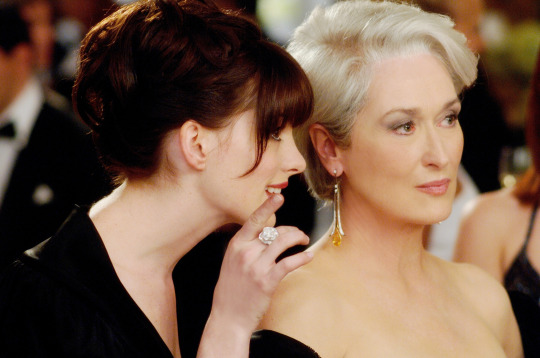
View On WordPress
#Anne Hathaway#behind-the-scenes drama#character transformation#character-driven storytelling#cinematic artistry#cinematic classic#cultural impact of cinema#director Rose Glass#Emily Blunt#emotional resonance in film.#empowerment through adversity#enduring film narratives#ensemble cast performance#fashion movie#film industry satire#film review#high fashion and film#iconic movie lines#Inspirational Movies#Meryl Streep#movie masterpiece#personal growth in cinema#strong female leads#The Devil Wears Prada#timeless films#workplace challenges
5 notes
·
View notes
Text
can't wait for succession season finale not because I watch it but because maybe after a while people will stop posting about it
#I jest. I want to see what some users have to say#but after that I am very happy not to endure the tragedy of some of the most evil people ever satirized#cor.txt
2 notes
·
View notes
Text


I love the melodramatic introductions to Stan Lee's comics
#when I first read amazing fantasy it caught me off guard like I wasn't sure if it was satire or what was going on. Still don't.#But now I adore it either way. It's just so 60s yk? Just so Stan Lee. Always crack me up. “As long as literature endures!!” HOISAFDHUFBFBSA#That sounds almost like a villain line (in the best way possible).#daredevil#matt murdock#comics tag#liveblog
1 note
·
View note
Text
it’s a pretty well-known phenomenon that you only get a couple seconds with your horror creature fully visible onscreen before it gets “chuckied,” a term coined by yours truly referring to the shift between the first and second acts of child’s play (1988) as the audience gets used to seeing the little chucky puppet moving around and consequently can no longer buy into the film’s serious slasher tone in the absence of the horror of the unknown. the tuunbaq in the terror and the dogomorph in alien 3 (1992) are also famous victims of chuckying—just like how lovecraftian horror usually falls flat on the screen, too much visibility and your scary, amorphous creature will become a very morphous puppet or cgi’d in picture. the easiest way to combat this is of course to keep the creature obscured for as much of the piece as possible; for instance, despite their oppressive presence throughout their respective works, the beast in over the garden wall is shown for less than six frames and the eponymous kaiju of cloverfield (2008) is never properly shown, allowing each to retain their mystery and danger. another route is to simply lean into the campiness of it, like the later child’s play franchise and alien resurrection (1997). in the case of the blob (1958) a mere satirical title sequence song is enough to completely transform a fairly standard creature feature into an enduring masterpiece of hokey fun. the third option to combat chuckying is for the horror creature to constantly transform—the thing (1982), the fly (1986), and aliens (1986) show their creatures in loving detail, but there is always something the audience hasn’t seen yet, something they don’t know to brace themselves for. it’s a fine line to walk, of course, but that’s the nature of the game when you want to turn the concept of the unknown into something knowable enough to bite you
5K notes
·
View notes
Note
mom!ellie taking her child to get their first shots w reader
but like ellie’s the one holding the baby trying not to cry once the baby starts crying 🙂↕️
okay so i'm in seventh heaven reading this because mom!ellie makes a return to my inbox, tis a joyous day everyone. but yes, i can just envision it so perfectly. reader, on the opposite wall to the chair & ellie, and a seemingly unaware baby giving you a doughy, beady, blank stare, and a few glances to spare towards the one embracing them arms-over-arms.
ellie could not get more riveted and smiley with the baby than she is now; lacings of auburn draping down her cheek as she grins downward, even she a totally unaware and in-her-own-world person—her world being her kid. “teeth are startin' to come in, huh buddy?” raising her arms a mere moment in rapture to wipe a thumb across their dry cheek, beginning a slow rock side-to-side. then, the doctor signals at the ready, and both corners of her lips are tucked away, straightened into apprehension.
she whispers to the little guy in her clasp, “i got ya' bud, there's nothin' to worry about.” her sweet child, calming him for the worst that's to come. once it does; soft skin broken by the needle, a near falsetto cry starts up below her, and all she can do is endure. embrace the source, and endure. legitimately, glancing away as it happens, casting her eyes up as a tactic to hold tears back.
obviously, you being so nonchalant and aware in comparison, notice the distress slowly inching on her features and point it out flippantly, “i take it this is your first shot too?” giving her a taste of her own satirical medicine. you aren't sure if the joke or the soft and final cries from your baby genuinely struck a tear in her waterline, but it glistens pearly all the same. ellie scoffs, “psh—what do you mean? m'totally fine, babe. not a single tear in my eyes.” ending up in a snotty laugh and a stream-lined cheek, rubbing one eye with the knuckle of her thumb.
#ellie williams#ellie williams x reader#ellie williams fluff#✮─── . aestra's bibliotheca#ellie tlou#⤹𓍢ִ໋aestras asks#lesbian#sapphic#ellie x reader#ellie williams fic#the last of us fanfiction#tlou fanfiction#ellie williams fanfiction#ellie williams imagine#mom!ellie#domestic!ellie#ellie williams concept#ellie williams blurb
461 notes
·
View notes
Text


smth smth arlathan au! solavellan + my own design for solas
where miha was a spirit of truth who was blinded by elgar'nan, then turned into a spirit of song (but mythal had no use for song & music during the war and so she was sent away abandoned, later solas would find a way to use her abilities for the rebellion)
she composed satire plays and tragicomedies about the elvhen and evanuris, all lost to time except the one about the dread wolf's betrayals.
the more people remember and sing her songs, the longer her spirit will endure - and everyone remembers that one song about fen'harel that she wrote but they forgot it was a satire rip ("what?? fen'harel eats your children???")
anyway the god of lies (allegedly) and a spirit of truth (previously) loved each other very much (rumoured)
#solavellan#mihariel#miha#solas#doodles#theresa draws#2025#they bond over feeling out of place in the war (although he encouraged her to use her songs to aid their people in the war)#miha goes from singing bard to murdering people with thunder and lightning thank you solas#they bond over being left behind by people they trusted (i love mythal but :)))))#and miha's song teaches solas about the enduring power of a really good story#solas: oh when you lie everyone sings about it but when i solas fen'harel lie-----
150 notes
·
View notes
Text
A federal judge on Tuesday night rejected the auction sale of Alex Jones’ Infowars to The Onion satirical news outlet, criticizing the bidding process as flawed and the amount of money that families of the 2012 Sandy Hook Elementary shooting stood to receive.
The Onion had been named the winning bidder on Nov. 14 over a company affiliated with Jones, whose conspiracy theory platform was put up for sale as part of his bankruptcy case stemming from the nearly $1.5 billion that courts have ordered him to pay over falsely calling one of the deadliest school shootings in U.S. history a hoax.
The decision by U.S. Bankruptcy Judge Christopher Lopez of Houston to not approve the sale means Jones can stay at his Infowars headquarters in Austin, Texas. The Onion had planned to kick Jones out and relaunch Infowars in January as a parody.
“We are deeply disappointed in today’s decision, but The Onion will continue to seek a resolution that helps the Sandy Hook families receive a positive outcome for the horror they endured,” Ben Collins, CEO of The Onion’s parent company, Global Tetrahedron, posted on social media late Tuesday. [...]
223 notes
·
View notes
Note
any lmk ideas you wish were touched on more often in fanfic??

Underused LMK Premises
Oh so many dude you don’t even understand-
1. Courtnapping as a legitimately bad thing. Not “ooh it’s romantic for demons” or “it’s just part of their culture” or “it’s proof of how much they love you” but like… a portrayal of courtnapping that actually demonstrates how viscerally dehumanizing it is to be stolen away by someone you might not even know and treated like a prize who can be won with the right application of charm or power.
(Like I’ve used it I think only once before and pretty much stopped at the “this is what demons do in general thing, but the potential for varied application is just… so high.)
Especially for mortals- imagine being bruised and battered from a long period spent unconsciously slung over someone’s shoulder or under their arm, strewn over a lounge chair or tied up in front of the kitchen table, seething. Eyes focused and hateful, knowing that this would happen eventually if they let down their guard or let a demon too close. It doesn’t matter how the monster peacocks about with that tome or this battleaxe, it’s not attractive, it’s not sexy,- and nothing can steal the feeling of violation that settles in over having been stolen from home in your sleep so you could get an extended IRL version of “I showed you my dick please go out with me” from a thirteen foot demon who is more interested in wooing you than actually wanting you.
Or just… old demons who mumble and huff about “losing their traditions” or “young demons going soft” as they look at woven tapestries in their homes, proud depictions of past conquests standing frozen in time, unaware that their great-great-grandson would lose his newest baby to a hysteric mortal’s iron-toed boot, wild with unforeseen hormones brought on by demonic birth, unaware that his youngest granddaughter would face a life of misery as she grew up, constantly stolen back and forth by two demons as part of a glorified pissing contest, both more interested in one-upping each other than the sapient being they steal from her room each night.
Young demons secretly taught by the last crotchety stalwarts of an old generation that “What you want is yours to take, if you can take it,” before their parents can snatch them away from great-great-great-grandfather and hurry off, praying their little one is too young to understand what was said. Growing demons brought up with those horrid words rattling their horned skulls, heeding and obeying them, then wondering why their dearest friends snap and crack as they’re “spirited away”. Grown demons who come up lonely and tired, seeing their diminishing race in a world flourishing with soft little mortals and wondering spitefully “Why did we ever stop conquering”, only learning the answer at the blunt end of a glowing golden staff when their time is near, the finishing blow timed to the cheers of their captives.
(If I ever write a satire fic, it will 100% be about a Y/N who gets isekai-ed into LMK, but instead of any of the cool or attractive protagonists, they get courtnapped by a crusty-handed, balding and portly demon who doesn’t practice hygiene or housecare. Just to put into perspective how actually awful the whole “I’m being kidnapped as a spouse” thing would probably really be if it wasn’t your attractive, young, in-shape, washes regularly blorbo doing the snatching.)
2. With this, demons just… not understanding mortals. Not for lack of trying, and not for lack of wanting, but through simple psychological incompatibility.
Demons struggling with empathy toward mortals because their minds are shaped by instincts that value strength, endurance, and survival of the fittest. Emotions that seem obvious to humans, like fear, discomfort, or sorrow simply not registering for demons in the same way. They see these reactions, but interpret them through their own lens, often believing that mortals are playing games or faking them or maybe outright performing.
Communal demons in broad daylight snatching up children for hours or days, only to return them with scars and bloodshot eyes, and wondering why they receive no gratitude for, in their opinion “taking up parental duties” without so much as being asked. After all, isn’t a little bit of “toughening up” good for children?
Demons who don’t understand “allergies”, especially when they range from “mild cough” to “near-instant death” and maybe misunderstand how epi-pens work- “Is stabbing the flesh a way to bleed the illness”, asks an curious demon with ancient eyes, worn hands, ragged skin, “and will any weapon do?”
Demons who become artists that need calligraphy tools so large they get mistaken for weapons. Demons who don’t understand tipping culture and assume they’re being fleeced. Demons who need custom chairs and custom clothes and custom bedding. Demons who pick fights on behalf of their friends and coworkers, and then to combat this, demons who get hired on as protection against “honor battles”.
Demons being demons, not just immortal humans.
3. Characters with variable ages that widely differ- like, I’ve gone on here and there about my view on ambiguous ages for characters and why I love that trope so much and how it makes a series infinitely more attractive to larger crowds and audiences than a concrete “14” or “23” or “46”, you know? And the fact that MK and Mei and Red Son could be sooo many different ages all in different configurations is super interesting to me!
Like, imagine- Adult!Red Son with Teen!Mei and Teen!MK, having an absolute full-throttle meltdown when he realizes that the two upstart semi-mortals who keep beating his demonic ass are teenagers. Red Son being both mortified at his continuous defeats and furious at these children’s parents for allowing them to fight in such high stakes.
And then with that slowly growing sense of pity and anger he just scoffs and shakes his head the one time they maybe aren’t in such high spirits (drenched from rain and wind and exhausted from the vigor of battle) and whisks them off to his family’s lair, throwing a demon-sized towel for them to share as he whips up something spicy for the kids.
Children.
They’re children.
He goes home and thinks on that, and then decides that maybe he just doesn’t want to fight them anymore.
Red Son then being reverse adopted by Pigsy + Mr. and Mrs. Dragon because, hey, if he’s playing big brother, might as well let him. Then Red gets to learn what (mostly) healthy family dynamics are through direct interaction and then hold his parents to those standards and basically everyone heals together.
Or hey, Red Son being a teenager while MK and Mei are adults! The two heroes doting on this ever-furious demon with treats and drinks to “cheer him up” after his frequent losses and kinda… accidentally teaching him what unconditional kindness is by becoming surrogate older siblings to the kid.
Red Son freaking out because his parents are going to be mad about this loss or that failure, and
(Red Son getting a phone call in the middle of a fight because PIF is mad he didn’t take out the trash lmao)
4. Y/N being protective of Sun Wukong.
Man, I don’t know if it’s just me but I don’t touch most romantic Shadowpeach x Y/N fanfics at all because I know I’m in for more of the same “Macaque legitimately being an awful person to someone he’s sharing a mate with/to one of his two mates and Y/N thinks it’s funny/doesn’t care” and just like… dude.
Like I know I’ve talked about how much I hate Fanon!Macaque, the simpering sadsack who only exists to get babied and patted on the ass, all his actions whitewashed and cooed over, so like, obviously I wasn’t gonna be a fan of this.
Maybe I’m just not the target audience here but like holy shit… why? It’s never portrayed as unhealthy or anything more than a silly goofy thing that Macaque is constantly tormenting someone he either is supposed to love or share a lover with, and the reader in regard to that mistreatment is little more a drooling dumbfuck without enough braincells to breath through their nose.
I don’t get it. A Y/N who says “Teehee my mate is being abused ‘oh noes’ but Maccy needs cuddles so I’ll disregard one half of my relationship~” is not a Y/N I care about, and I don’t see what’s so compelling about neglect and mistreatment portrayed as the order of the day. I don’t see the merit in “I’m Y/N, and I’m stupid and blind to abuse!”
Cause I think it’s so much more interesting if it’s like…
“Do that again and you’re out.”
And Macaque whips around in shock, looking up from the shadow portal he just shoved Wukong into. “Excuse me-“
“Do that again,” you repeat, voice low and tense- Wukong would be fine, you were more angry than worried-, “and you’re out. Gone. Out of my house and out of my life.”
“I wasn’t-“
“I don’t give a fuck, Macaque! You will not MISTREAT my mate in my own house!”
“I- it’s not- I don’t-“
“I DON’T FUCKING CARE! HE’S NOT A FUCKING PUNCHING BAG, SO I’M NOT LETTING YOU TREAT HIM LIKE ONE!”
You know, a scenario where Y/N isn’t a passive enabler of abuse and bullying, and they actually have a voice of their own outside of “Teehee Mac you’re sooooo mean to my lover but I’m totally okay with that for some reason!~” but also gives Macaque explicit instruction on what he needs to do in order to better the relationship (ex: not abuse their other mate), in which they aren’t stupid or unforgiving and all three can grow together, instead of the usual: “Macaque isn’t ever a bad person. But when he is it’s not a big deal. But when it is his victims “deserve” it.”
5. Transhuman identities and abilities. I mean, just… there’s shapeshifting and magical artifacts and all manner of mystic trinket in the world. Does being gay or trans really matter when anyone can learn the 72 Transformations and become what they wish? Is it any bigger a deal than your child deciding they’re going to live life as a dog, or a demon? Are there potions to make these transformations permanent? Can a person become a demon, instead of transforming into one?
Does being immortal fuck with your taxes? Does knowing magic fuck with your insurance? Does your family look at you differently after you’ve tasted that ambrosial nectar, consumed that slice of eternity? Do they fear or long for a taste? Does your grandmother refuse to come to your wedding, ashamed that you would “break yourself from the cycle”? Does your mother cry into her hands that you wed a demon? Do you run to an old monastery to elope, wed by an old monk with ancient eyes because no other soul will officiate you and that demon? Will you be welcome in the celestial realm if you wed a heavenly soldier? If you take the hand of a god? What will you have you learn? How long until you feel at “home”?
Just… humans getting into mystical trouble outside of battles.
(If anyone else has some stuff they’d wish was expanded on more often, feel free to add on in the comments or reblogs!)
#Time Talks#Lego Monkie Kid#LMK#Shadowpeach#Sun Wukong#Macaque#Courtnapping#MK#Mei#Red Son#Traffic Light Trio
151 notes
·
View notes
Text
spooky indie visual novels you've never heard of for spooky season
since it's October I thought I'd put together a list of spooky indie visual novels (horror, Halloween, creepy, dark comedy, anything in the spirit of the season goes) that you've probably never heard of but can play right now on itchio!

model employee
Model Employee is a corporate horror visual novel. Just discharged from the hospital and massively in debt for their life-saving cybernetics, the player-character must adapt to the “extreme” work-life balance of a Tethys Team Member- but they have help. Penny, the artificial personality that controls all security, waste disposal, and employee surveillance in the facility, specializes in reinforcing an especially cutthroat variety of workplace culture- and she’s taken an interest in you. If you want to get ahead in your career, you gotta be willing to take some risks.
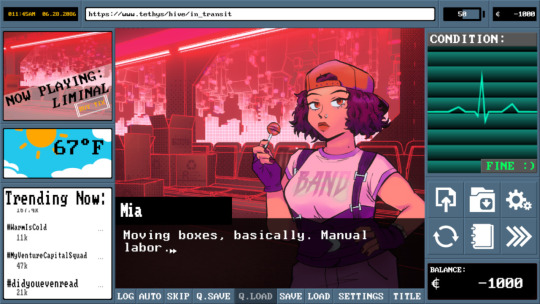
model employee is such a tightly structured visual novel for being made in just one month for a game jam, making full use of everything while surprising you at every corner. every part of this game was so well planned and thought out- dystopian corporate satire isn’t my cup of tea (we’re living it) but the way they present everything in this game makes it feel so much more intense.
beary the hatchet
It’s Halloween 199X, and you killed someone during your morning shift. Honestly it’s inconvenient. This job was imperfect, sure, but you got to wear a mask with no questions asked and the pay was livable. But now you’ll have to keep the body in the backrooms till your shift is done. Bummer. “You’re… the absolutely WICKED and AWESOME Bearwater Grizzly Killer, aren’t you?!” …and now enters the dreaded true crime fan.
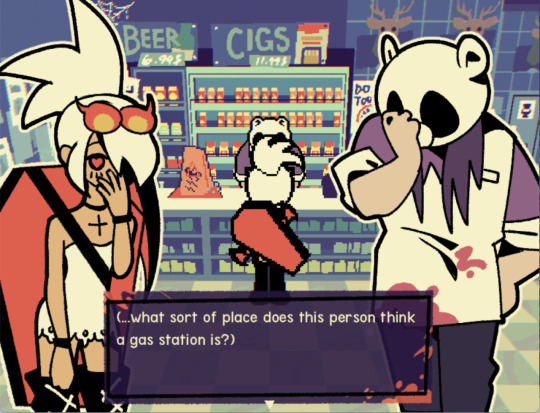
beary the hatchet is such a uniquely lovely game to look at, even if the subject matter is grim. I love the color palette and tones in this, I love the 2.5D graphics, I love how expressive all of the designs are. it’s a game oozing with style.
WE KNOW THE DEVIL
Anyone can kill the devil; that’s why they always make teens the vampire slayers, the magical girls. But some kids can’t even get that right; and that’s why meangirl Neptune, tomboy Jupiter, and shy shy Venus have to endure one more week of summer camp and each other, singing boring songs about jesus, doing busywork for adults, and hoping god’s radio can’t hear them. Before they can leave the summer scouts, they’ve got to spend twelve hours in the loneliest cabin in the woods and wait for the devil to come and live through the night–or not. You know.

it’s a visceral experience, something that feels foreign and familiar at the same time. I love the direction for it, the sketchy monochrome sprites against the colored photos- parts when there aren’t any characters on screen feel that much more real, like you’re watching found footage because of how tense everything is.
disconnect
Late at night, a phone call from a friend keeps disconnecting from you… On and off, on and off, constantly… …What would you do if you realized your friend wasn’t who you thought they were? And how would you react when the truth was finally revealed? (“̷̢̑W̸̨̊o̸̫͊u̷̱͝ḽ̸͛d̴͉̐ ̵̚ͅy̵̜̽o̸̥͗u̷̮̎ ̷̜̏s̶̤̄t̸̥͐i̴̻̕l̸̰͝l̸͉̓ ̷͕́ȁ̸̩c̸̡̓t̵̜̊ ̵͓̈t̶̙̄h̶̦͂e̸̩͠ ̸̩̅s̶̘̏a̷̪͛m̵̮͒e̴͖͑ ̸̭́w̷̨̚á̴̱y̵̯̑?̶͎̌"̷͈̆) Find out what happened to our scaredy-cat protagonist, Indie-a famous horror storyteller on the H-T-M (Horror, Tales, and Mystery) forum. What would she do when she unintentionally uncovered a mystery hidden deep within her own home?

I love the style of disconnect and the unorthodox way of getting to the truth of the matter. I’m not normally one to play furry VNs, but the designs are adorable and I love the presentation of the game, it has a lot of animation in it. there’s also one moment not too far in on this screen that made me scream…
curse of the juniper tree
Curse of the Juniper tree is a tale of two siblings, a cursed tree and an isolated village. It is a short kinetic visual novel featuring 2d exploration. Walk around the snowy village and talk to its inhabitants! Story is loosely based off the fairytale called The Juniper Tree by the Brothers Grimm in Grimm’s Fairy Tales in 1812.

this is a lovely and short story about two siblings living in a frozen land together. it’s a very atmospheric story with so many beautiful blues and detailed character designs. the controls were a bit hard to figure out at times but it’s worth your time.
reaplaced
Grea Perrim is a reaper of souls, and it’s her duty to bring the deceased to the other side. But in the world of reapers, death isn’t any kind of equalizer. The value of a soul is directly tied to the peculiarity of its death. Grea’s supernatural senses bring her to a Halloween house party with three costumed guests. She soon finds the most valuable kind of soul: the victim of a locked-room murder. In order to reap the soul, Grea must unravel the identity of its killer and explain its death in full. Is this the work of a human? A witch? Or something else entirely…?
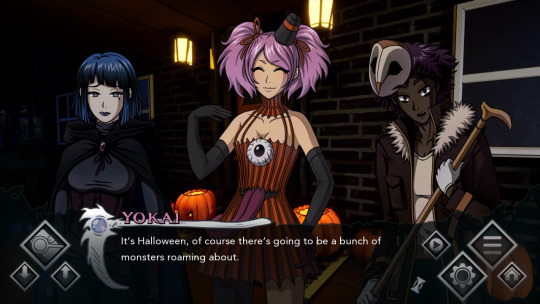
reaplaced is a fun little whodunnit set on Halloween about a grim reaper out on the hunt who finds herself in the middle of a murder mystery. it’s much more indepth than I was expecting and the soundtrack is wonderful—there’s a lot of small touches to it that make it great.
Silver Thread
An exorcist that doubts the existence of ghost might sound contradictory but to Alicia Wilkershire, this is the right way to get closer to the truth. Her latest job sounded like another run-of-the-mill case and she greeted her client with her usual pessimism but is it, really?

Silver Thread is a spooky and short RPGM game about a skeptical exorcist trying to help a guy with his problems. the style is lovely and if you also like this kind of style, the developer has several other RPGM games like this!
Elevator Hitch
Elevator Hitchis a short 2.5D surreal horror/escape room visual novel with point-and-click and puzzle elements following the story of two co-workers suddenly finding themselves stuck together in a "Perfectly Normal" 70s office elevator. They must explore each liminal-looking floor and find a way to get off the elevator to their actual destinations.
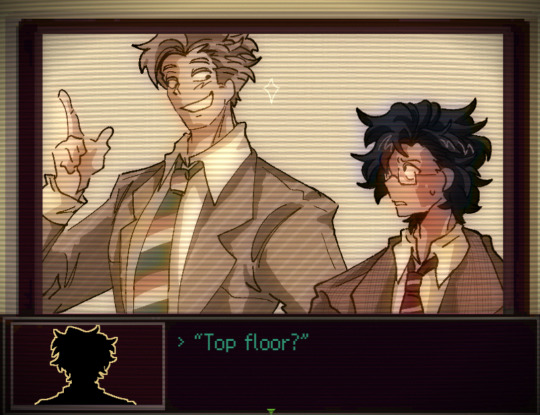
like a few others on this list, Elevator Hitch was made in just a month for the Spooktober Visual Novel Jam and was my favorite game from the year it came out (2022). it's more of an adventure style game than pure visual novel, so expect puzzles and a lot of bad ends! this developer also has a lot of other similar style adventure visual novels.
The Case of the Serialized Killer
When a popular illustrator is found dead, disgraced demonologist Harold Ludicael is hired to summon her ghost. Ghosts are the one thing he can't summon, but with sharp insight, perhaps he can solve the mystery, and resurrect the most important thing: His career.
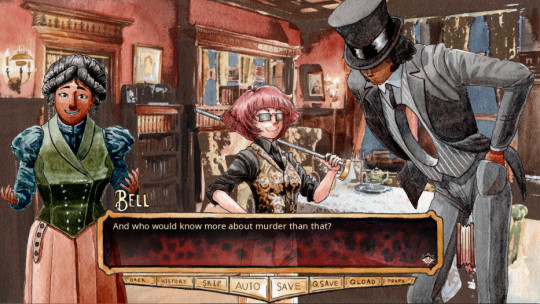
this visual novel is an absolute feast on the eyes as all of the art is done by traditionally painted watercolor artworks! the characters are all unique and the world feels very lived in. if you like murder mysteries then check it out.
Stillwater
"𝕊𝕖𝕖𝕚𝕟𝕘 𝕤𝕥𝕣𝕒𝕟𝕘𝕖 𝕥𝕙𝕚𝕟𝕘𝕤 𝕔𝕠𝕞𝕖 𝕒𝕥 𝕒 𝕡𝕣𝕚𝕔𝕖…" A woman arrives with a mysterious letter in hand addressed to her grandfather. Etched in crimson is a foreboding message, a warning—a promise made from a time forgotten. Private Investigator Hugo Laurent and his assistants must solve this bizarre case before an old family's curse befalls them all.

Stillwater is a lovely looking game - I love everything about the art direction for it. it's not overly scary but very atmospheric with several endings to find.
Who is the Red Queen?
Alice falls down the rabbit hole into a Wonderland not quite right. Meeting an eclectic collection of people, animals, and some things in between, she sets out on an adventure in this odd new place to find the missing Red Queen. Or, more specifically, to find the pieces of the dismembered queen whose body has been strewn across the land.

a familiar but new take on Alice in Wonderland, now with a lot more yuri. like a lot of the VNs I've recommended, this was originally made in just 1 month. this one in particular has a lot of dead ends, mention of gore & dismemberment, and other content warnings.
okay now that you've made it this far I'm going to promote my gay horror / Halloween visual novels
Asphodelium
Hazel is an ex-adventurer who's settled down with some of his previous guildmates after the adventure of a lifetime—taking down a doomsday cult that tried to end the world, but at the cost of killing their former guild leader who turned against them. Despite their adventure still haunting him months later, he's tried to move on. —That is until a man with the same face as their guild leader approaches him. This is a story about cults and killing and killing cults. And being in love.

Asphodelium is a melancholic dark boys love visual novel that I made solo in about 3 months. it's entirely in NVL mode (I love you NVL) and around 3 hours long and my personal favorite game I've made so far.
Dahlia
a vampire has snuck into your room while you were sleeping. the only question is - are you next on her menu? Dahlia is a very short sapphic visual novel made in under 36 hours for the Velox Formido game jam, a jam for shortform visual novels. survive being trapped with a lovely little vampire, or don't.

also NVL mode because I love NVL mode. this is a short and sweet vampire visual novel I made solo in a weekend for a game jam that has several different endings.
Witch You Want
With a rather sparkly magical paper, you find a job listing for a local witch needing an assistant with making potions before the town festival that weekend. You sign up, unsure exactly what to expect...... A pompous and questionably excellent witch runs a local apothecary in town but finds that if she wants to make enough potions before the festival that weekend to sell (and keep her ongoing potion shop afloat) she'll need some assistance. After a dubious help wanted ad, she gains you as an assistant. Will the two of you see through to the festival? Will you be able to make a single potion? Will this girlfailure capture your heart?!

this is my latest visual novel that released just a few days ago! I directed & programmed this short cutesy game for a game jam at our studio. it's pretty fluffy romcom with a potion minigame in it. please help our girlfailure make potions, she needs all the help she can get.
#visual novel#visual novels#indie games#game recs#game recommendations#visual novel game#my recommendations#most of these are spooktober entries#I tried to only include finished or basically finished games#so no demos#and not every entry is straight up horror#some are more just about Halloween and some are partially comedic#there's a wide range here I think!
184 notes
·
View notes
Text

The mortality model of DRDT characters in Ch3— Using mathematical methods to determine their death rate!
Below is the final formula and their rankings:
Final Formula:
Raw Mortality Score =
(Character Development × 0.1) + (Counterarguments × 0.8 + Agreements × 0.2) + Foreshadowing × 0.4 + (1 - Plot Relevance) × 0.5 + Gender Adjustment + other adjustments
Total Mortality: 300.0%
No.12 Teruko Tawaki: (Mortality Rate: 0.000%)
Character Development: 45%
Teruko's life is like a black comedy—chosen by fate to endure extreme misfortune, yet this curse has made her the most tenacious survivor.
She managed to escape death under Xander's knife but couldn't escape the fate of betrayal. This "constant dance on the edge of life and death" makes her very existence the most pungent satire of "hope"--when luck becomes a shackle for survival, hope is nothing but a slow-acting poison that prolongs pain. The moment she was stabbed not only tore her body but also severed her last shred of trust in humanity. From that moment on, she built a defense with sharp words and a cold attitude yet secretly licked her wounds of betrayal at night. Unlike most protagonists, she would choose to watch a murder for survival and expose others' scars for the truth but was still briefly shaken by Eden's embrace--this contradiction of being "cold on the outside and warm on the inside" exposes her longing for and fear of emotional connection: she is afraid of being hurt again but also yearns to be redeemed by warmth.
This girl cursed by fate is piecing her own crown with broken glass. When all lies and betrayals turn into dust later on in the story, Teruko's soul will still shine--that is, the courage to fight after recognizing the absurdity of the world and the stubbornness to maintain dignity after being repeatedly trampled by fate.
Counter-argument or Agreement CG Display: Number of counter-arguments=0, Number of agreements=0 (She is the protagonist, after all)
Foreshadowing: -100% (Just kidding) A remarkable girl with super bad luck and is basically unlikely to die. Her death will definitely not occur in the middle of the plot.
Relevance to the Main Plot: 100%.
No.11 Eden Tobisa: (Mortality Rate: 9.019%)
Character Development: 30%
She seems like a gentle, lively, and extremely energetic cute girl. She likes to hum songs while baking cakes and tries to make friends with everyone, even Teruko when she was in a state of self-isolation. However, she always inadvertently triggers disastrous plotlines: be it baking activities that leads to a bloodshed, or organizing a team-building activity that results in people fighting... But even when someone pointed a scalpel at her throat, she could still cry and deliver words of encouragement, having the strange, saintly mindset of "although I can't forgive you, I want to help you turn over a new leaf" towards the murderer.
However, this little girl, who is less than 150 cm tall (after the height adjustment) and has "I choose kindness" engraved in her DNA, stabbed one of the tallest and strongest person in the whole group; and gouged out his eye and while crying... Not to mention her high degree of fit with the theme of "despair time"... (Eden... Why on earth did you do this?) All in all, there are still many mysteries surrounding her, and we look forward to further revelations in the future.
Counter-argument or Agreement CG Display: Number of counter-arguments=0, Number of agreements=0
Foreshadowing: None
Relevance to the Main Plot: 75%. She has a completely opposite personality to Teruko but loves everyone, seemingly embodying the characteristics of a traditional female protagonist.
No.10 Whit Young: (Mortality Rate: 11.333%)
Character Development: 10%
The most mysterious man in the whole story. So far, all we know is that "his family includes a cold and neglectful father and a deceased mother whom he loves deeply." We don't know whether he grew up beside his father, whether his father abandoned him, whether his mother was as kind as he thought, whether his mother committed suicide by hanging (at what age this happened) why he can be so indifferent to others' deaths and even make terrible and inappropriate black jokes about Min's death, why, as a "Matchmaker" who should be very empathetic, he says so many things without considering the atmosphere, why, with his extremely sharp intuition (it's impossible that he didn't sense Xander's killing intent towards Teruko), he still tried to match Xander and Teruko together and even strongly encouraged everyone to vote for Teruko at the beginning of the trial, and why he only showed such a terrifying expression after the elevator to the infirmary couldn't be opened...
Everything is a foreshadowing. I like this character precisely because of this; he gives me infinite space for imagination and reasoning. Rushing the 90% of development in Chapter 3? Seems not very likely.
Counter-argument or Agreement CG Display: Number of counter-arguments=0, Number of agreements=0
Foreshadowing: None
Relevance to the Main Plot: 50%. He has an extremely close relationship with Charles, who is a foil to Teruko; and is a foil to David, the "antagonist".
No.9 Rose Lacroix: (Mortality Rate: 17.453%)
Character Development: 40%
As the Ultimate Art Forger, Rose captures the world in photographic detail—yet her gift becomes a prison, ensnaring her in a labyrinth of recollections. The paradox of her genius lies in this duality: the very skill that elevates her artistry condemns her to relive every memory with unforgiving vividness.
Beneath her lazy facade, she is a prisoner of her own mind. Min’s execution haunts her like a recurring nightmare, while Nico’s betrayal shatters her already fragile trust. Sleep becomes her sanctuary—a drug to numb the onslaught of hyperthymesia—yet even dreams cannot escape the ghosts of chromatography and familial debt.
The killing game forces her hand. When art transforms from a livelihood to a weapon, Rose must confront her deepest demons. Will she seek redemption on the canvas… or let her talent consume her?
Unanswered questions still linger: What binds her to XF Tech? How can she ever untangle the knot of hyperthymesia? Chapter 3 will force her to face these truths—for in a world where memories are both treasure and torture, the only escape may be through the act of creation itself.
Counter-argument or Agreement CG Display: Number of counter - arguments = 0, Number of agreements = 1
Foreshadowing: None
Relevance to the Main Plot: 50%. She is the only character that has an esablished connection to XF tech in the canon plot.
No.8 Arturo Giles: (Mortality Rate: 18.263%)
Character Development: 35%
Arturo is one that uses a surgical mask to conceal his fear of his own mediocrity and builds class barriers with his caustic words. In his distorted value system, beauty is divinity, and ugliness is a sin. As is expected, this arrogant man who regards "commoners" as ants is actually a coward haunted by the shadow of his sister's suicide. When Eden uncovered his hidden scar, his anger and fear exposed the most festering wound in his heart—the paranoid pursuit of "perfection" ultimately backfired and became a cancer that devoured his humanity.
However, when the usually cowardly Ace grabbed his collar and roared at him, even Arturo himself couldn't stay out of the "mortal" affairs. Presumably, what happened between Ace and Levi will teach him something about his immature character.
Counter-argument or Agreement CG Display: Number of counter-arguments=0, Number of agreements=0
Foreshadowing: None
Relevance to the Main Plot: 25%
No.7 Levi Fontana: (Mortality Rate: 19.174%)
Character Development: 40%
He killed three people and committed patricide, yet in the killing game, assumes the role of a "protector", which exposes the nihilistic nature of his moral system—he determines the rightness or wrongness of actions based solely on social labels rather than inner principles.
Lacking empathy, he maintains a veneer of normalcy by imitating social norms. He is one that feels guilty about Ace's violent behavior but fails to understand Teruko's grief; one who can accurately analyze others' outfits but cannot read the complex spectrum of human nature; one that admits that he "does good deeds" to gain a sense of security and group recognition rather than out of kindness.
However, when he voluntarily revealed his motive, the group recognition of his completely disappeared, and pretending to be kind was of no use--still, when the bullet was aimed at Teruko, he protected her. Is this a mechanical execution of the "good guy" script? Or did he suddenly realize something else? At least, his complex character image makes it highly likely that he will survive within the first three chapters.
Counter-argument or Agreement CG Display: Number of counter-arguments=0, Number of agreements=0
Foreshadowing: None
Relevance to the Main Plot: 25%. Currently, there is no clue indicating his connection to XF.
No.6 J Rosales: (Mortality Rate: 21.903%)
Character Development: 85%
As the Ultimate Theater Special Effects Expert, J weaves stage illusions with pyrotechnics and light—yet her true artistry lies in manipulating reality’s contradictions. She loathes actors’ flamboyance, viewing their performances as mere escapism, while her own existence becomes a paradox: a street-smart survivor who weaponizes rationality to mask trauma. Her hoodie isn’t just attire; it’s armor, shielding memories of her mother’s rigid femininity drills.
Caught in a psychological maelstrom, she oscillates between calculation and chaotic emotion. She dissects Ace’s murder motives with detachment, yet spirals into irrational vengeance over Arturo’s harassment—a duality driven by her fear of losing control. Her disdain for "girly shit" isn’t mere rebellion; it’s a war cry against the mother who tried to mold her into a doll. Yet beneath the tomboy bravado, Arei’s playful barbs reveal a flicker of vulnerability—a girl desperate to be seen, not as a gender experiment, but as a human.
When the curtain falls, her illusions crumble. The same pyro skills that once dazzled crowds now illuminate her personal hell: a tightrope walk between hating and being hated, sanity and unraveling. Her quest for equilibrium isn’t just survival—it’s a scream against the hypocrisy of a world that demands she choose between authenticity and annihilation.
Counter-argument or Agreement CG Display: 0 counterarguments, 0 agreements
Foreshadowing: None
Main Plot Relevance: 25%. J is closest to Arei, but we all know what happens to the other party… unless you wanna count Arturo (not)!
No.5 Nico Hakobyan: (Mortality Rate: 24.375%)
Character Development: 75%
While they can understand the anxiety of pets; they fail to misinterpret human malice. Their enduring violence with the patience of a veterinarian treating animals ultimately turned into a murder weapon.
This transformation from a "healer" to a "perpetrator"; from an "extreme doormat" to a "rational avenger" exposes the fluidity of the identities of oppressors and victims, accompanied by a complete disappointment in human nature. Although the motive for the attempted murder is sympathetic, the group's condemnation of their actions reveals the cruelty of the survival rule—in a confined space, any overstepping behavior may become the fuse for everyone's demise.
When the healer is no longer needed and kindness becomes a fatal weakness, they are forced to write a new survival fable on the boundary between bestiality and humanity with their hands stained with human blood. But at least after attempting to kill someone in Chapter 2, we hope their performance in Chapter 3 will be better.
Counter-argument or Agreement CG Display: Number of counter-arguments=0, Number of agreements=1
Foreshadowing: None
Relevance to the Main Plot: 25%
No.4 Charles Cuevas: (Mortality Rate: 37.131%)
Character Development: 90%
Can’t believe it's already been over a year since I started watching DRDT... Back in February 2024 he was my favorite character. However, Whit's prophecy about him, "Pronounced dead at three", always made me extremely worried. At that time, when I talked about this with my friend, they comforted me by saying, "At least the identity of his elder brother is still a mystery!" Then in March, Elliot's music video came out...
Initially, he was sure an isolated jerkass; an arrogant student who believed himself to be above his classmates, often isolating himself and looking down on others. Nevertheless, after being framed in Chapter 1, he realized that secluding himself was not the best way to survive. By Chapter 2, he became much less antagonistic and was willing to talk and work with others. In the trial, he made full use of his intelligence and proved himself smart, like when Teruko initially dismisses his advice about time but later admits he was right, and when Hu agrees with him about her unreliable testimonies.
In terms of his relationships, he has developed a unique dynamic with Teruko. In episode3, he mentions that despite their personality changes, they will continue to make snide comments (a very big death flag). He also forms a gay relationship with Whit in Chapter 2 after Whit respects his fear of blood and tries to hide it from others.
To sum: in terms of both character development (achieving in two chapters what all Byakuya-style tsundere characters usually achieve in five chapters) and backstory development (regarding his brother and family), Charles definitely has the most well-rounded development among the living characters. Even if we include the deceased characters, only Arei has a more comprehensive development than him... Yeah, he’s at extremely high risk.
Counter-argument or Agreement CG Display: Number of counter-arguments=1, Number of agreements=0
Foreshadowing: 100%. There's no need for me to elaborate on this. Everyone is familiar with that well-known line, "Charles Cuevas, pronounced dead at three."
Relevance to the Main Plot: 75%. He serves as a direct foil to the female protagonist, Teruko. If he survives Chapter 3, with his intelligence, he would no doubt be the best support, similar to Kyoko Kirigiri.
No.3 David Chiem: (Mortality Rate: 39.680%)
Character Development: 80%
This is a man who uses honey-sweet speeches to anesthetize the world, yet when alone; rips open the festering sores of human nature, leaving them bloody.
However, his danger lies not merely in hypocrisy but in the surgical precision of his methods. Knowing exactly how to wrap oppression in the guise of "positivity" and mask control with "change"; in Chapter 2, under the pretext of "revealing secrets to stop the killing game", he actively incited the group to expose their private information, turning human weaknesses into fuel for violence. This means of "committing evil in the name of good" makes him a more dangerous presence than the murderer Ace—for when the victims voluntarily jump into the trap, the executioner's knife seems relatively clean.
Yet his psychology runs deeper than mere villainy. When he mocked the deceased during the trial and his pupils turned to grey; those hopes he once regarded as stars were nothing but self-deception to cover up the void of the universe. Admitting that Xander is "the only one worthy of respect"; he longs for sincerity but chooses to destroy out of fear of being hurt. In contrast to Arei, who self-destructs due to the longing for love, David destroys others because he hates being loved.
Ultimately, his smirk during the trial—"I'm a lying, manipulative, scumbaggy piece of shit"—marks the completion of his role transformation from an actor to an audience member. This former self-help inspirational speaker ultimately completed the rebellion against social discipline through self-destruction. His downfall is not a matter of moral corruption but a violent treatment of the social illness of "having to be positive"—in a world where positive energy is used to gloss over the truth, David's madness might be the clearest cry.
Counter-argument or Agreement CG Display: Number of counter-arguments=2, Number of agreements=0
Foreshadowing: 100%. The exploded chair and bloodstains in the LGI MV? "I will disappear at chapter 3?" We can only wish him good luck. At least we should hope that "disappear" doesn't mean vanishing.
Relevance to the Main Plot: 75%. He stands directly opposite the female protagonist, Teruko, during the class trial. He is considered the antagonist by most people.
No.2 Veronika Grebenshchikova: (Mortality Rate: 50.047%)
Character Development: 65%
As the ultimate horror fan, Veronika's soul seems to be soaked in a palette of blood and screams. She is proficient in the psychology of fear and can use precise language to probe others' weaknesses (such as her psychological analysis of Ace), yet she admits that she is afraid of making an irreparable mistake. This contradiction of "manipulating fear but fearing the consequences" forms the core tension of her personality.
Simultaneously, her behavior oscillates between sadism and self-preservation. She hates hypocrisy but takes pleasure in exposing others' scars. Her very existence is a source of unease in the group—for instance, her excitement when talking about the details of the execution and her morbid appreciation of Arturo's evil deeds make her a catalyst for the horror atmosphere. However, when horror turns from fiction into reality, she falls into cognitive dissonance.
The real turning point arrives with Min's execution. She realizes that "death outside the script" cannot be aestheticized, and "fiction is fiction. In the back of your head, you'll know that it'll never happen." This abrupt confrontation with reality forces her to confront her own detachment: she sees through everyone's essence but chooses to stand by because she can't empathize. Ironically, this kind of clarity only exacerbates her sense of alienation.
Now, this girl who worships fear as a religion stands at the critical point between fiction and reality. With horror no longer just a seasoning in the script but a survival rule, and her alienated yet fascinated attitude driving others away, the question looms: can Veronika find redemption in the horror narrative she has constructed?
Counter-argument or Agreement CG Display: Number of counter-arguments=0, Number of agreements=1
Relevance to the Main Plot: 25%. Unfortunately, although Veronika's personality and intelligence are fully capable of playing the role of an antagonist, there is no direct evidence in DRDT to prove that she has a close relationship with the protagonist.
No.1 Hu Jing: (Mortality Rate: 51.622%)
Character Development: 70%
She protects her companions with maternal ferocity. However, her overbearing protectiveness—exemplified by her "smothering" of Nico—breeds resentment. The paradox of her selflessness is rooted in an underlying fear of losing control, a trauma etched by three failed suicide attempts.
Her quest to impose order on chaos backfires when her blind defense of Nico stalls the Chapter 2 trial. This act of "sacrificing truth for safety" exposes the fragility of idealism in desperate times. (In a way, she mirrors Sayaka Miki: both cling to the myth of selflessness while refusing to acknowledge their own complicity in perpetuating harm.)
The inevitable breaking point arrives with David’s betrayal and Nico’s révélation. As her emotional armor cracks, the girl who once sought solace in guzheng melodies now weaves her final redemption from fractured strings.
Yet as the butterfly’s wings begin to crimson, a haunting question persists: Can she transcend her role as a "guardian" to complete the final 30% of her evolution into an "awakener"? The answer may lie buried in the next chapter’s bloodstained pages.
Counter-argument or Agreement CG Display: Number of counter-arguments=1, Number of agreements=0
Foreshadowing: 50%
Relevance to the Main Plot: 25%. Unfortunately, Hu doesn't seem to be the kind of character who can make it to the end.
Summary:

Why this works:
First, the plot relevance inversion mechanism serves a crucial role in enhancing the narrative complexity and realism of the story. Non-main characters are usually seen as supporting elements, but in reality, they can have a significant impact on the overall outcome. For example, in a crime thriller, a seemingly insignificant witness (a non-main character) might hold the key to solving the case, and their actions or fates can completely change the direction of the plot. By giving non-main characters a higher chance of being involved in critical plot points related to mortality, the model creates a more balanced and engaging story. It also encourages the exploration of secondary characters' backstories and personalities, adding depth to the overall narrative. Secondly, The foreshadowing nerf aspect of the model is a vital safeguard for maintaining the integrity of the plot. In storytelling, foreshadowing is a powerful tool, but it can sometimes be overused. When there is a "100% implication” for characters like Charles and David, it can make the story too predictable. Therefore, chances that their foreshadowing is just a red herring are high. Overall, this mathematical model as a whole is a carefully constructed system that balances multiple aspects of storytelling. It takes into account narrative logic, the need to avoid obvious red herrings, and gender-related constraints.
P.S. It's important to note that this model is only an estimation. While it provides a framework for creating a story, the actual success of a narrative depends on many other factors.
76 notes
·
View notes
Text

Mathurine (fl. 16th–17th century, d. 1627) served as a jester at the courts of three successive French kings. Far from being merely an entertainer, she used the considerable freedom afforded by her role to influence the political and social dynamics of her time.
The kings’ jester
Mathurine held her position under Henri III, Henri IV, and Louis XIII. Contemporary accounts mention her regular presence at court, where she fulfilled the traditional duties of a jester: entertaining the king and his courtiers. She was likely an accomplished dancer, musician and acrobat.
The role of the court jester was fully institutionalized. Beyond mere amusement, jesters had the unique privilege of saying what others could not. While female jesters were typically employed by queens, Mathurine was exceptional—she was the first, and last, woman officially appointed as a king’s jester.
An subversive and influential woman
Mathurine’s persona blurred the lines between madness and cleverness. She subverted social norms by dressing in male attire and carrying a sword, often appearing in public dressed as an "Amazon," a role she proudly embraced. Known to ride armed through Paris, she reveled in challenging expectations.
Her courage and quick thinking were evident during a failed assassination attempt on Henri IV. She ran and slammed the door shut, preventing the assailant’s escape.
Mathurine’s voice extended beyond the court. A series of satirical pamphlets, known as the Mathurinades, were attributed to her. Through them, she shared her opinions and displayed her sharp wit. A staunch Catholic during a period marked by tensions between Catholics and Protestants, Mathurine used her platform to advocate her beliefs.
Uniquely positioned to navigate both male and female spheres, as well as public and private spaces, Mathurine wielded significant influence. She often acted as an intermediary between Henri IV and the courtiers. For instance, she once was paid to help a woman secure an audience with the king. Her proximity to power was well known—she dined at the royal table and accompanied the king on official travels, though her omnipresence sometimes drew criticism.
Following Henri IV’s death in 1610, she continued her service under Louis XIII. Records show she was still receiving a pension in 1622 for her contributions as a jester. Mathurine died in 1627, but her legacy endured, her name resurfacing in later court writings.
If you enjoy this blog, consider supporting me on Ko-fi!
Further reading:
Canel Alfred, Recherches historiques sur les fous des rois de France et accessoirement sur l'emploi du fou en général
Lemaignan Marion, “Un espace au cœur du pouvoir. Mathurine et sa folie à la cour d’Henri IV : marginalité, rituel et politique”
Lemaignan Marion, “Mathurine ou la question d’un tiers espace de l’hétérodoxie, dans La Confession catholique du Sieur de Sancy d’Agrippa d’Aubigné”
Mathurine, Les essais de Mathurine
#history#women in history#women's history#mathurine#16th century#17th century#renaissance#female authors#french history#france#women's history month#historyfacts#historicwomendaily
64 notes
·
View notes
Text
The Philosophy of Punk
The philosophy of punk is a distinctive blend of cultural rebellion, DIY ethos, and anti-establishment attitudes. Emerging from the punk rock music scene in the 1970s, punk philosophy has since evolved into a broader subcultural movement that encompasses music, fashion, art, and social commentary. Here's an exploration of the core tenets and influences of punk philosophy:
1. DIY Ethic
At the heart of punk philosophy is the "Do It Yourself" (DIY) ethic. Punk advocates self-sufficiency and creativity without reliance on mainstream institutions or commercial interests. This ethos encourages individuals to create their own music, art, and fashion, often using limited resources. It fosters a sense of empowerment and community, as punks produce and distribute their own records, zines, and merchandise.
2. Anti-Establishment and Rebellion
Punk philosophy is deeply rooted in anti-establishment sentiments. It rejects conventional norms, authority, and societal expectations. Punk often criticizes political systems, corporate greed, and social inequalities. This rebellious stance is reflected in the raw and confrontational style of punk music and the provocative nature of punk fashion, which frequently includes ripped clothing, bold hairstyles, and symbolic accessories like safety pins and leather jackets.
3. Individualism and Authenticity
Punk values individualism and authenticity, championing the idea of being true to oneself. It opposes conformity and encourages people to express their unique identities and beliefs. This focus on personal authenticity often translates into a rejection of polished, commercialized aesthetics in favor of raw, unfiltered expression.
4. Anarchy and Libertarianism
Many punk subcultures are influenced by anarchist and libertarian ideologies. Punk philosophy often promotes the idea of a society without hierarchical structures or authoritarian control. Anarcho-punk, a subgenre of punk, explicitly incorporates anarchist principles, advocating for direct action, mutual aid, and community-based alternatives to state power.
5. Social and Political Activism
Punk philosophy is not only about music and fashion but also about activism and social change. Punk bands and communities frequently address issues such as anti-racism, gender equality, LGBTQ+ rights, and environmentalism. Punk's activist spirit is evident in its support for grassroots movements, protests, and various forms of direct action.
6. Cultural Innovation and Subversion
Punk is known for its cultural innovation and subversion. It challenges mainstream cultural standards and pushes the boundaries of artistic expression. Punk art, music, and literature often employ satire, irony, and shock value to critique societal norms and provoke thought.
The philosophy of punk is a multifaceted and dynamic ideology that encompasses a wide range of attitudes and practices. At its core, punk is about rejecting conformity, embracing individuality, and striving for authenticity. It promotes a DIY ethic, challenges authority, and seeks to create a more just and equitable society through activism and direct action. Punk's enduring influence can be seen in various cultural and social movements, making it a vital and vibrant part of contemporary philosophy and culture.
#philosophy#epistemology#knowledge#learning#education#chatgpt#Philosophy Of Punk#Punk Ethos#DIY Culture#AntiEstablishment#Rebellion#Individualism#Authenticity#Anarchism#Libertarianism#Social Activism#Cultural Innovation#Punk Fashion#Punk Music#Grassroots Movements#Subcultural Philosophy
157 notes
·
View notes
Note
Hey, you seem cool, got any book recommendations?

Want a true adventure story, and a dip into some polar history where no one actually died on an expedition gone horribly, horribly wrong? Read Endurance, by Alfred Lansing.
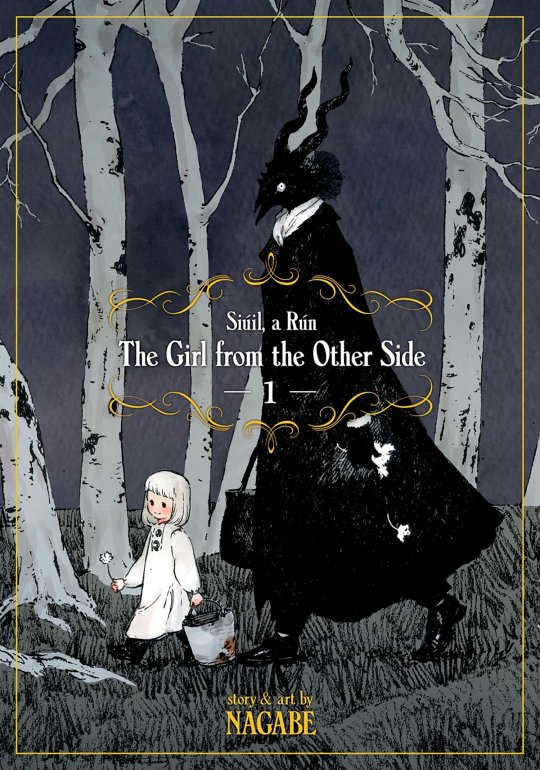
How about a melancholy manga about found family and redemption? Check out The Girl from the Other Side, by Nagabe.
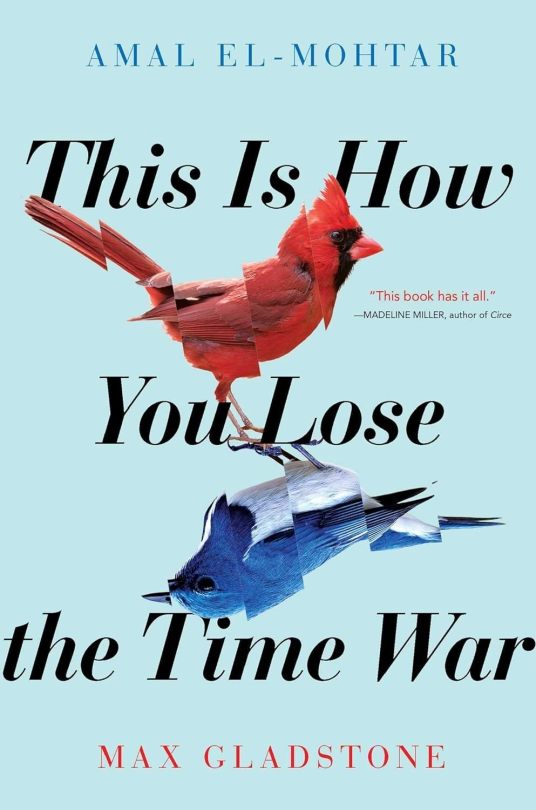
Or how about an epic sapphic romance that bends the idea of star-crossed lovers further than I have ever seen? That's This is How You Lose the Time War by Amal El-Mohtar & Max Gladstone.
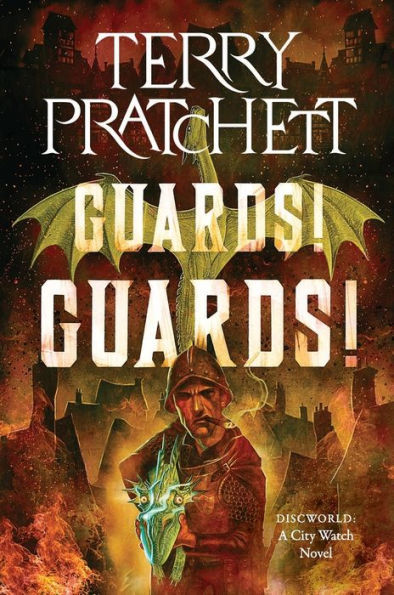
Do you like humor, satire, and philosophy in your fantasy? Get into one of the many sub-series set within Terry Pratchett's Discworld. Guards! Guards! is a perfect starting point.

Are you a big fucking nerd that is interested in everything and enjoys thinking about how we think and who wants a super dense book to sink their teeth into? Pick up Godel, Escher, Bach by Douglas Hofstadter and have a notebook handy to write in.
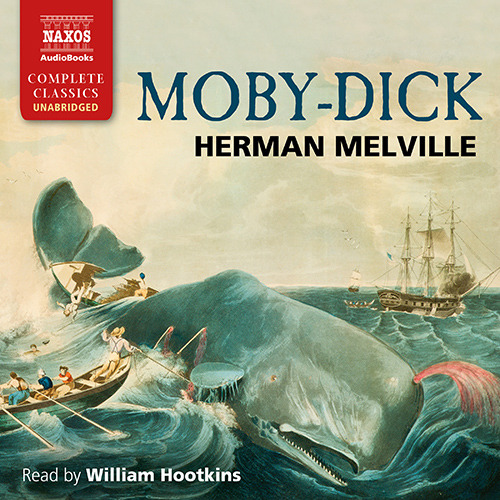
Want to give an old classic a fresh visit? I'm convinced Moby Dick was meant to be read aloud, and William Hootkins is a stellar narrator. He makes Ishmael sound like your gay uncle with ADHD trying to tell you a story.
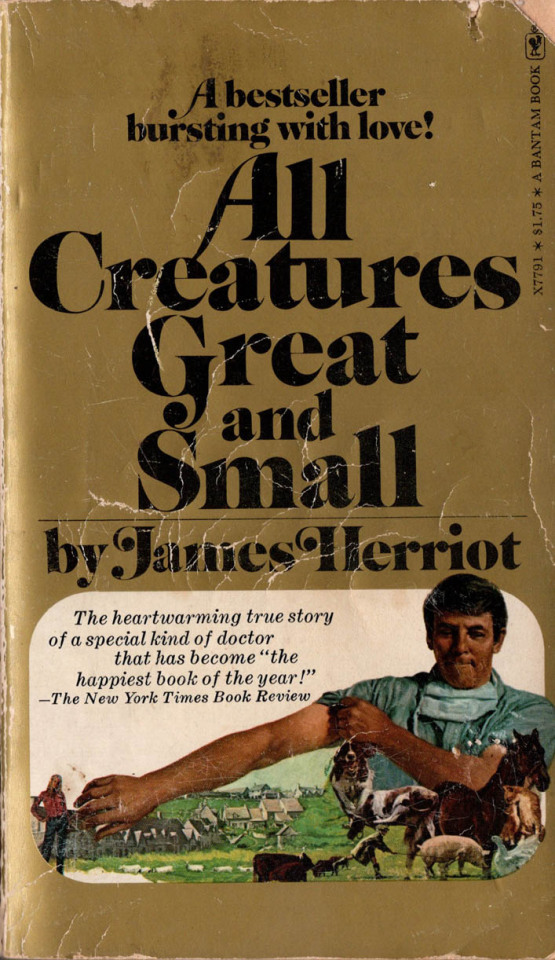
Love animals and 1930/40s Britain? Want something cozy and easy to pick up / put down in per-chapter chunks? Check out All Creatures Great & Small, by James Herriot.
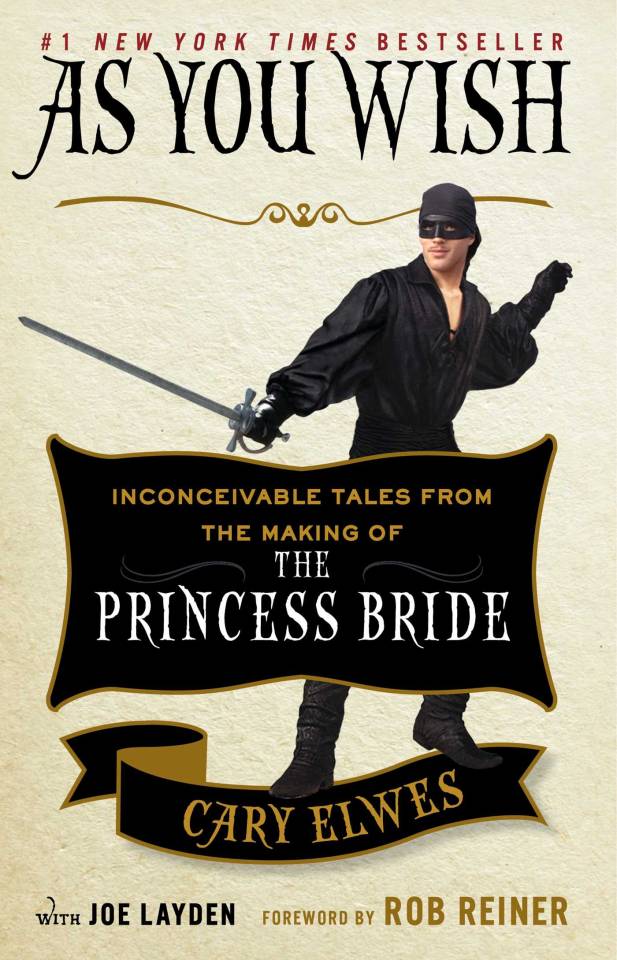
Do you love the move, The Princess Bride? Need another book to listen to? Get Cary Elwes' retrospective, As You Wish on audio.
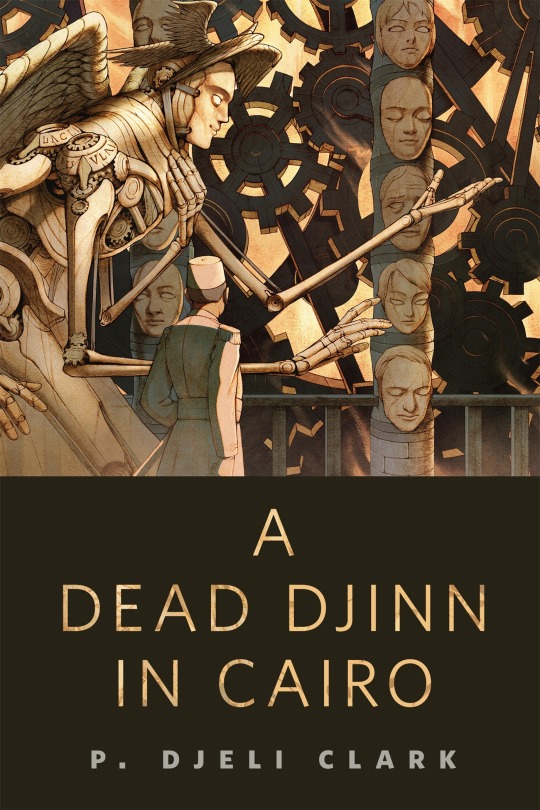
Want a short read, set in a magical steampunky AU that isn't euro-coded for fucking once? A Dead Djinn in Cairo is a great entry point to P. Djèlí Clark's work.
Hope this gives you some options!
38 notes
·
View notes
Text
I watched Will Ferrell's You're Welcome America. A Final Night with George W. Bush from just after Dubya stepped down in 2009 and it feels similar to The Onion's takes on Bill Clinton and Joe Biden where it's lightly roasting the guy but ultimately constructing a comic character where he is a laughable goofball protagonist that makes it difficult to grapple with the actual person and his acts in the world.
part of it is that Dubya was sufficiently popular to get reelected by fifty five million people, which combined with the conventional deference for American institutions makes it difficult to critique the system or the man in any meaningful way, so the only things left are to joke about his stupidity or his sexuality or his inauthenticity or his alcoholism or whatever else.
and I think we could see the same with Trump! it's been observed that he has an incredible drag queen energy, amazing stage presence, you don't even need to satirise the guy you can just lip sync his literal words and it's already a hilarious show, and the temptation to do that is irresistible compared with trying to get systemic.
of course to take it to extremes we did the same with Hitler too, from the comedy takes released before and during the war itself to his role as an exaggerated self satire that endures to this day.
it's understandable but as a critique it's empty and doesn't teach anything about the person or the society that they shape.
38 notes
·
View notes
Text
RIP Tracy Tormé, Creator of the "Holodeck Malfunction Episode" and Sliders
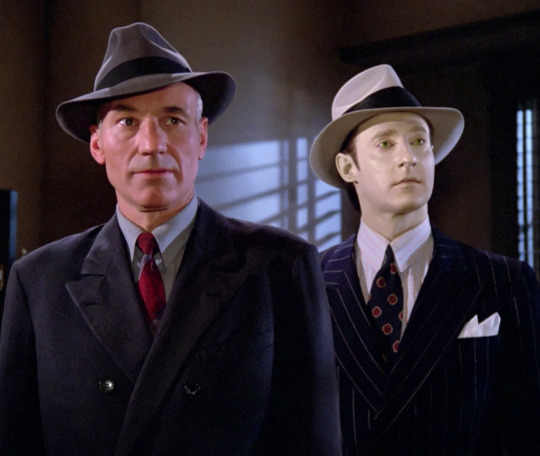
Tracy Tormé’s most enduring legacy in popular culture is that, while a writer on TNG’s tempestuous first and second seasons, he created the entire concept of the Holodeck Malfunction Episode.
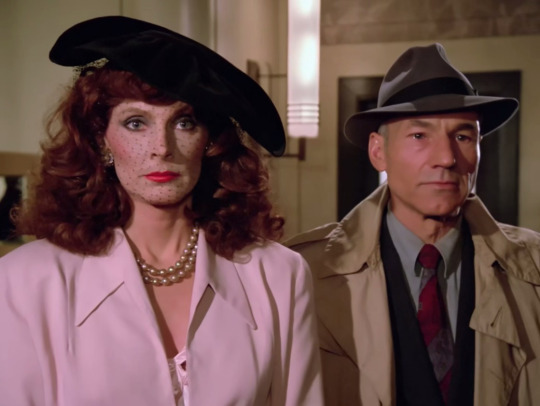
Yes, even people who suggest you skip TNG’s first couple seasons say that “The Big Goodbye” is one you don’t want to miss. And there was a very nice tribute to Tracy Torme in an episode of Picard, which had him as the author and creator of Dixon Hill… which he is, and deserves credit for this.
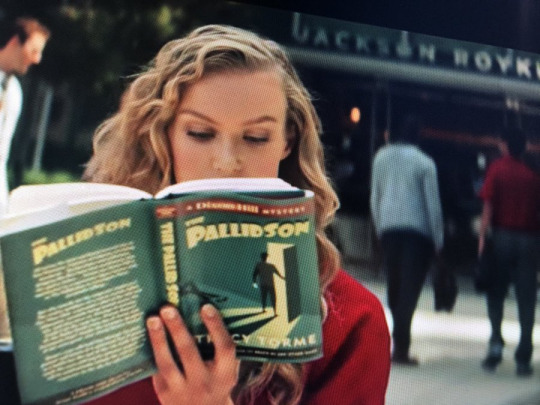
I suppose I should mention I had a personal encounter with Tracy Tormé at a convention. The main thing I remember was that he looked absolutely terrified when someone asked him about what happened with “The Royale,” far and away TNG’s worst episode except the clip show, about the crew getting trapped on a hotel they can’t leave from a badly written book. To his great credit, he took responsibility for the episode not working and did not pass on the problems to the production crew.
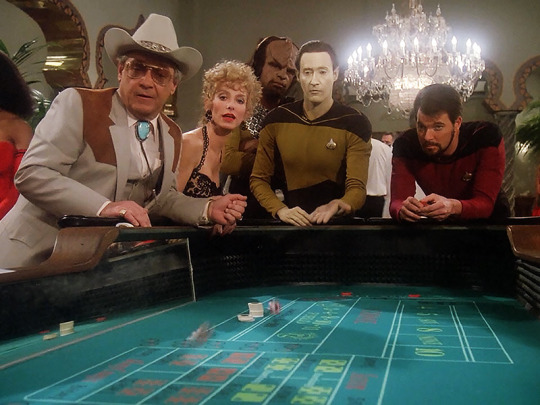
The most extraordinary thing about Tracy Torme is that he had a Forrest Gump like ability to appear in the background of scifi culture’s greatest moments.
Not only was he inside the TNG writers’ room in 1987-88, he was around during the production of Terminator with James Cameron. Tormé was the one who, hearing about the production of the film, squealed on it to Harlan Ellison, telling Ellison that it was based on his old Outer Limits episodes, with a visual based on his script for “Demon With a Glass Hand.” In other words, he was the Gavrilo Princip who got that entire conflict started, where two of the most proud personalities in scifi butted heads, James Cameron vs. Ellison. Cameron, to this day, insists that the film company gave Ellison money and a credit because it was easier to pay him off than to go through litigation (which rings true, frankly, for risk averse production companies), and to this day Cameron insists, with his absolutely expected big dick swagger, that Ellison is a “parasite” who received money for nothing, and if it had been up to him, he wouldn’t have given him a dime.
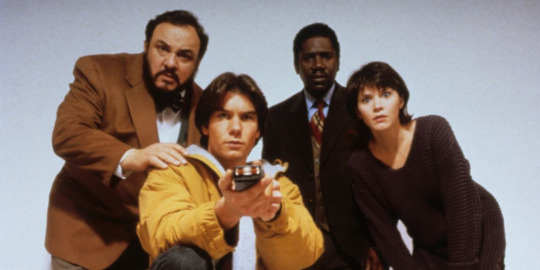
It’s also worth mentioning that Torme also created the TV series Sliders.
Has anyone else noticed that Sliders is an incredibly right wing show? Seriously, watch it again if you haven’t seen it in years. If you haven’t watched this show since the 90s and you were a kid and all that went over your head, it’s kind of amazing how Limbaugh/Newt Gingrich era right-wing Sliders actually was. It made 24 look like Doonesbury. The targets of Sliders were 90s New Right satire: health care systems, infuriating hippies, the nanny state disallowing the public smoking of cigars, California weirdness, the drug culture, the USSR. Torme’s right wing views were less John Millius-style “blood alone moves the wheel of history” stuff, but more like that of a slobby regular joe in the 90s, Dennis Leary’s character in Demolition Man for instance, who mostly just wants to smoke cigars, ogle girls, and eat hamburgers without getting scolded by his wife. He was less “Passion of the Christ” and more “Animal House.”
I am not saying this as a negative, but merely a description. Contrary to popular belief, right wingers driven by bizarre sexual pathology and weird grudges produce amazing art, as Millius and John Swartzwelder show. A lot of Steven Universe fans love to say things like “all good art is about empathy and kindness” and I reject that notion. Good art can also be about reflecting things in the human experience like fear, trauma, cruelty, and paranoia.
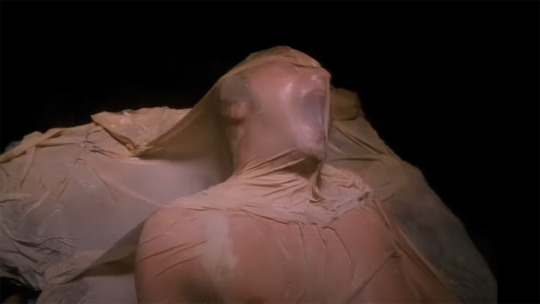
For that reason, it doesn’t surprise me that Tracy Torme’s best movie script was a horror film about a traumatic experience, Fire in the Sky. An ominous movie about a vanished ranch hand who was the victim of alien abduction, in the earned finale the film’s tension builds toward, our hero remembers the true cause of his missing time: an abduction by aliens, who’s motives are emotionless and incomprehensible, and who subject him to horrific vivisection that we see in excruciating detail. Travis Walton is treated not with sadism or cruelty, but with icy detachment, by alien superintellects that view him as no different than cattle, and are to him as we are to cattle. The most terrifying detail of the film is that the classic “gray alien” look turns out to be spacesuits, revealing a far more frightening appearance underneath.
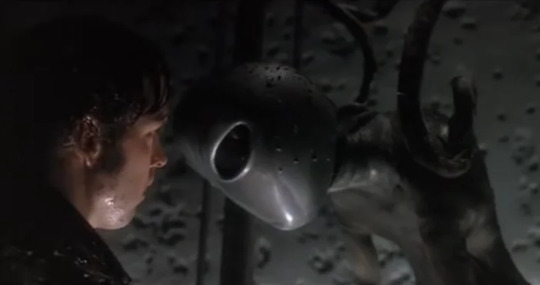

378 notes
·
View notes
Text
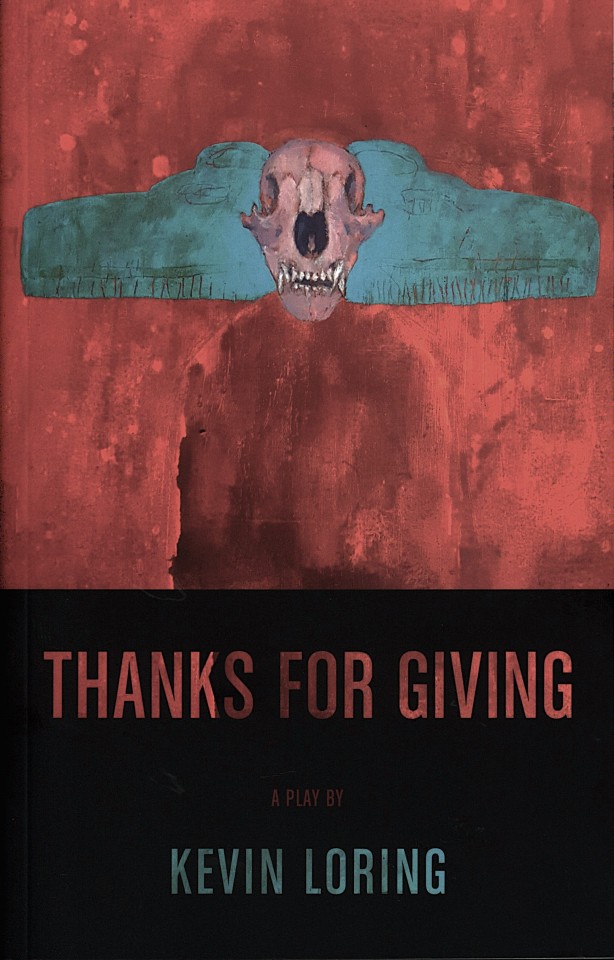
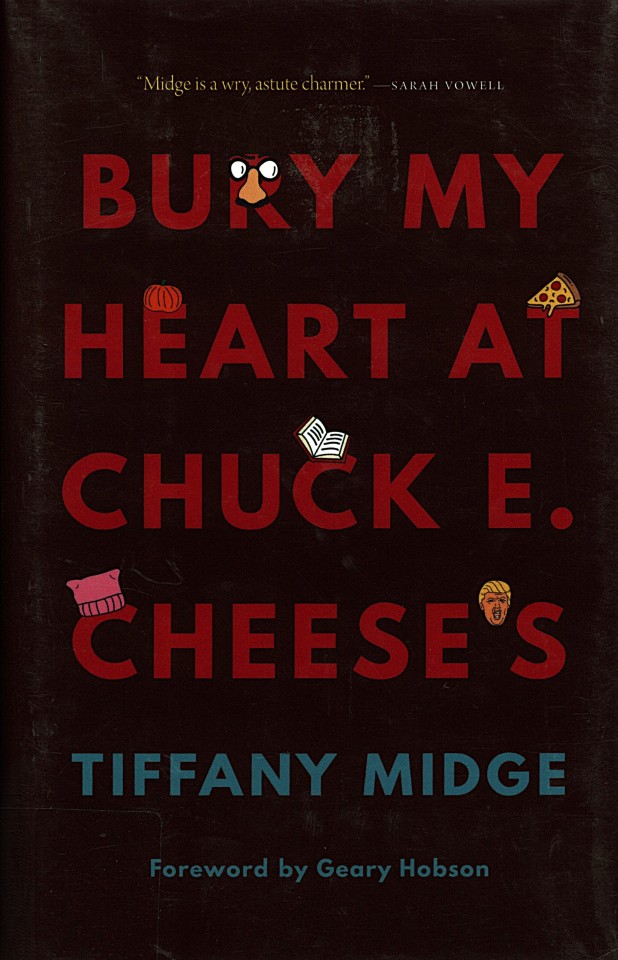
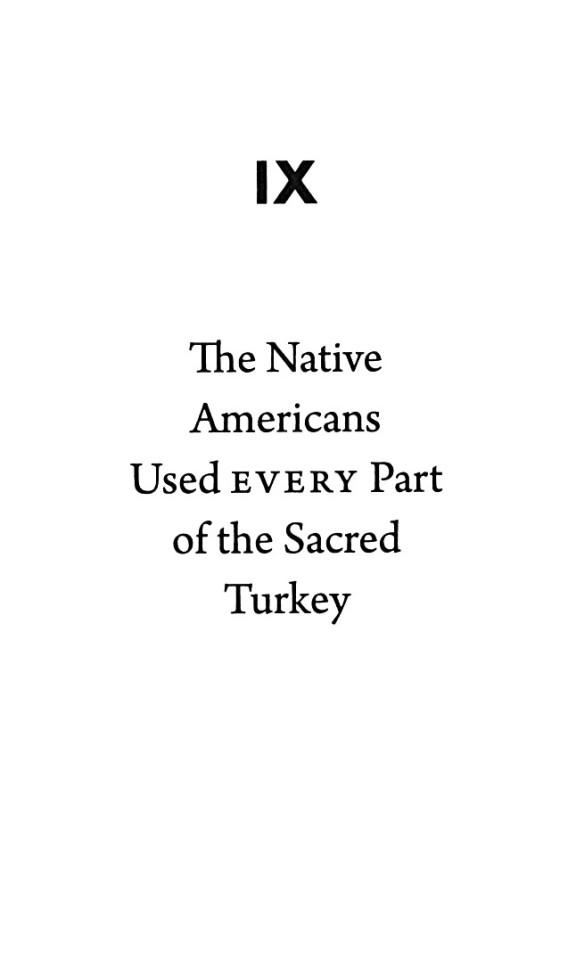
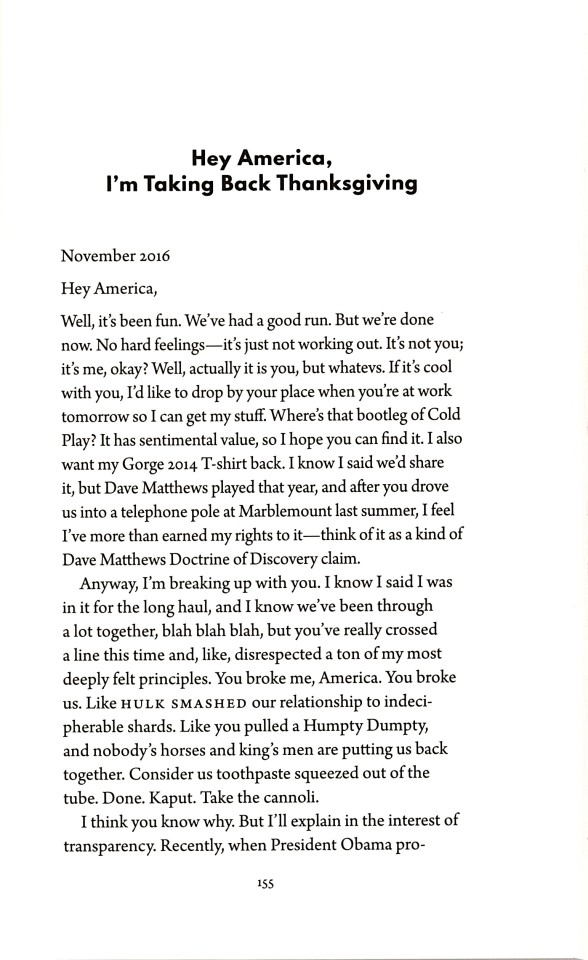
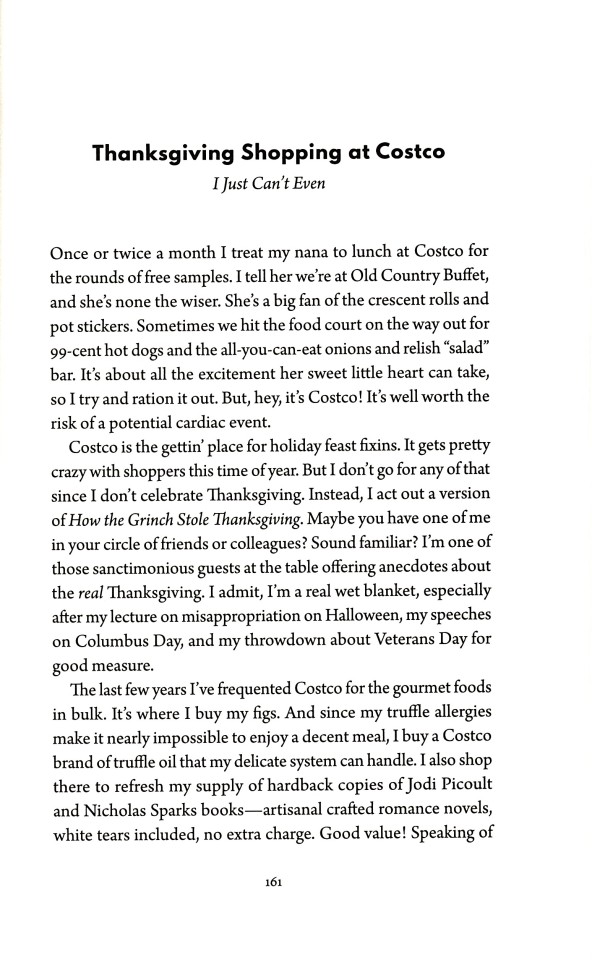

An Indigenous Thanksgiving
Here's a short list of titles for your holiday reading by three noted Indigenous writers: Kevin Loring (Nlaka'pamux; b. 1974); Tiffany Midge (Hunkpapa Lakota; b. 1965); Larissa FastHorse (Sicangu Lakota).
In Loring's play Thanks for Giving (Talonbooks, 2018), a mixed-family Thanksgiving dinner comes face to face with some unsolicited truths and sibling rivalry, where the old ways surrender to new possibilities, but the family's enduring spirit continues forward, ever fierce.
FastHorse's publication presents two of her plays The Thanksgiving Play (2017) and What Would Crazy Horse Do? (2014), published together by Theatre Communications Group in 2021. In The Thanksgiving Play, a group of well-intentioned white teaching artists scramble to create an ambitious "woke" Thanksgiving pageant that also celebrates Native American Heritage Month. Amidst their eagerness to put on the most culturally sensitive show possible, things quickly begin to devolve into the absurd. In What Would Crazy Horse Do?, Calvin and Journey--twins who are the last two members of Marahotah clan -- flounder after their grandfather's passing, and form a suicide pact in case their lives on the reservation become too hopeless.
Midge's Bury My Heart at Chuck E. Cheese's (University of Nebraska Press, 2019) is a compelling collection of the author's satirical musings on life, politics, and identity as a Native woman in America. We leave you with a snippet from Midge's Thanksgiving offering, "Hey America, I'm Taking Back Thanksgiving":
Hey America, Well, it's been fun. We've had a good run. But we're done now. No hard feelings -- it's just not working out. It's not you; it's me, okay? Well, actually it is you, but whatevs. . . . Anyway, I'm breaking up with you. . . . You broke me, America. You broke us. . . . I think you know why. . . . I'm taking back Thanksgiving. It was mine to begin with; you were just appropriating it to satisfy your need for some happy-go-lucky fairy tale in the midst of crimes against humanity. . . . No turkey for you. I'm taking it back. . . . No more cranberries, no more stuffing. And that roasted brussels sprouts dish your grandma makes, . . . I'm taking that too. . . . Don't Tweet me, don't message me. We're done. I hope you figure yourself out and someday get your life and your country together. Good luck. . . . P.S. I flirted with Canada behind your back, but they're not working out either, so don't even think of looking for me there. I've moved on.
While Midge has moved on, we haven't quite yet, and we wish you a pleasant Thanksgiving Day.
View posts from Thanksgivings past.
View other posts from our Native American Literature Collection.
#Thanksgiving#Thanksgiving Day#Indigenous authors#Indigenous writers#Native American authors#Native Americans#Indigenous#indigeneity#Kevin Loring#Tiffany Midge#Larissa FastHorse#plays#Indignous plays#Native American Literature Collection#Indigenous American Literature Collection
51 notes
·
View notes